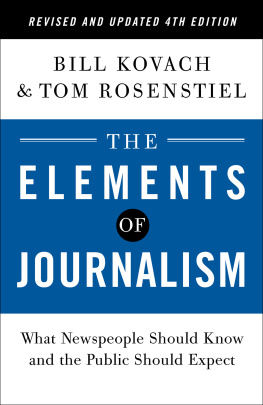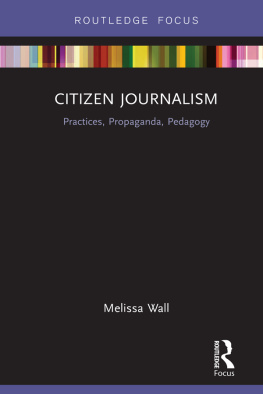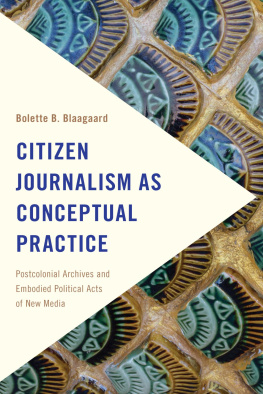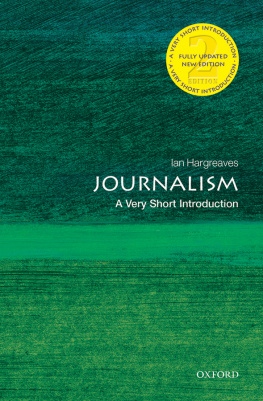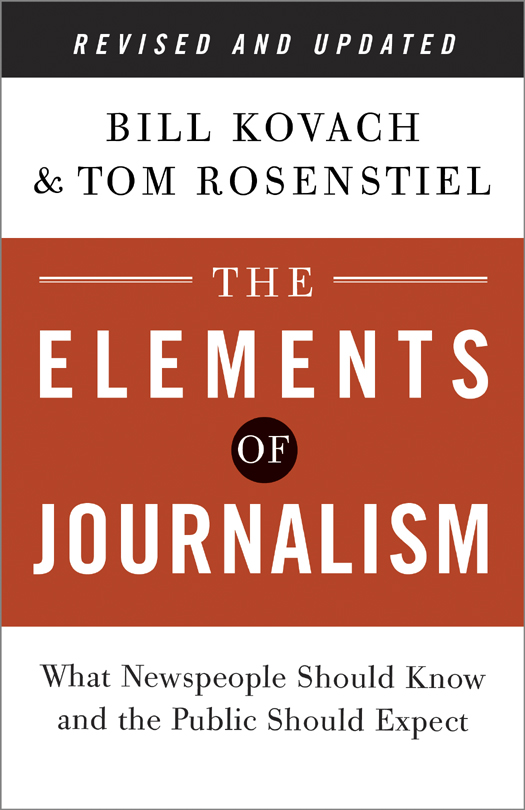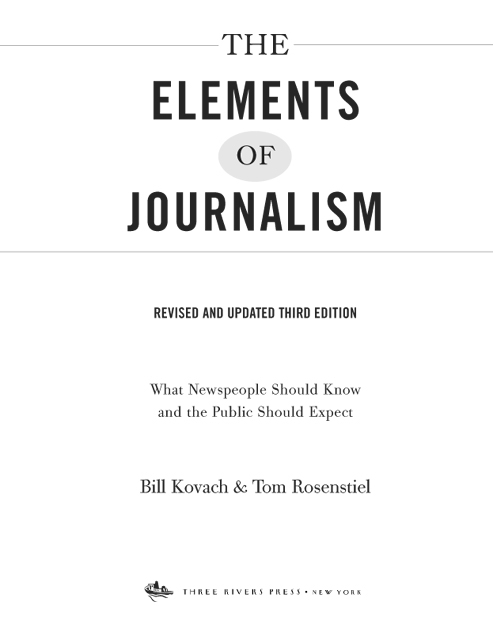ALSO BY THESE AUTHORS
Warp Speed: America in the Age of Mixed Media
Blur: How to Know Whats True in the
Age of Information Overload
Copyright 2001, 2007, 2014 by Bill Kovach and Tom Rosenstiel
All rights reserved.
Published in the United States by Three Rivers Press, an imprint of the Crown Publishing Group, a division of Random House LLC, a Penguin Random House Company, New York.
www.crownpublishing.com
Three Rivers Press and the Tugboat design are registered trademarks of Random House LLC.
Grateful acknowledgment is made to Cable News Network, Inc. (CNN) for permission to reprint a text excerpt from the show Crossfire (October 15, 2004). Reprinted by permission of Cable News Network, Inc. (CNN).
Originally published in hardcover in the United States by Crown Publishers, an imprint of the Crown Publishing Group, a division of Random House LLC, New York, in 2001 and subsequently revised and published in paperback by Three Rivers Press, an imprint of the Crown Publishing Group, a division of Random House LLC, New York, in 2007.
Library of Congress Cataloging-in-Publication data is available upon request.
ISBN 978-0-8041-3678-5
eBook ISBN 978-0-8041-3679-2
v3.1
For Lynne
&
For Beth and Karina
When we first wrote this book in 2001, our purpose was different than it is now.
Our intention then was to identify common principles shared by people who called themselves journalists working in different mediums and traditions. Even then, these shared ideas and theories of journalism were not as well understood or articulated as many might have supposed, including by those in news. People in different media tended to use different vocabularies. Many often mistook their practicesthe techniques they used every day at their jobsfor fundamental principles of purpose. (The concept that journalists should get at the truth of events is a principle. The use of the inverted pyramid structure for writing news stories is a practice.) Most journalists, trained in an apprenticeship model that emphasized craft, tended to dismiss as too theoretical such abstract questions as trying to define the role of journalists in society. There was also a growing culture war in news companies at the time between business and editorial people as they eyed the growing pressures caused by the coming digital revolution. The reason we wrote this book, in part, was that this vagueness about journalisms underlying principles and values had left journalists vulnerablefirst to a counting house mentality that discouraged investing in innovation, then to an epochal digital disruption that demanded journalism rethink how it fulfilled its fundamental purpose on behalf of citizens.
But back then, the values we unearthed that made up the elements of journalism were largely the domain of professionalsa loosely organized group who practiced journalism for a living and who called themselves journalists.
Now, a dozen years later, our goal in this new edition is different in one important respect. Our purpose is to identify the core principles that underlie the production of responsible journalism in which anyone in the world might be staff.
Journalism and the elements of journalism should concern all citizens today even more than they once did precisely because the distinctions between citizen and journalist, reporter and editor, audience and producer are not vanishing but blurring. Journalism isnt dying. It is becoming more of a collaboration. And journalists are not being replaced or becoming irrelevant. Their role has become more complex and more critical.
This transformation has been particularly profound since the second edition of this book was published in 2007. Media brand names that dominated the twentieth century, such as Newsweek magazine and the Times Mirror and Knight Ridder newspaper companies, are gone. Network TV newsrooms have shrunk by more than half, newspaper newsrooms by more nearly a third, and newspaper industry revenues by even more. To a significant degree, in less than half a decade, digital disruption has overturned the economic model that sustained news reporting and presentation for more than a century.
In the face of this, we are increasingly asked the same question:
To what extent do the principles that guided journalism in the nineteenth and twentieth centuries still apply? Indeed, are there any principles at all?
As the contours of the digital revolution have grown clearer, we have grown even more confident that not only do the elements of journalism endurebut in an age when anyone may produce and distribute news, they matter even more.
What has been transformedprofoundlyis how those who produce news fulfill those principles.
The reason the core elements of journalism endure is simple: They never came from journalists in the first place. They flowed from the publics need for news that was credible and useful. The elements of journalism are the ingredients that allow people to know the facts and context of events, to understand how they should react to that information, and to work on compromises and solutions that make their communities better. Journalists didnt create these needsthey simply developed a series of concepts and methods for meeting them.
Today, these principles are more important precisely because whether a work of journalism comes from a trusted brand name is no longer the only clue to its value. In an age when journalism may come from many sources, we must all learn to navigate with a more discerning eye to know which content is credible and which is suspect.
The elements of journalism, in other words, always belonged to the public. To survive as citizens today, we must understand them, own them, and apply them as never before.
Whether a news report is produced by a citizen eyewitness, funded by a grant from an advocacy nonprofit, or delivered by a conventional news source, for instance, we still need it to be truthful. But in an age when false rumors may be tweeted in real time, how someone reporting the news fulfills the principle of truthfulness has changed substantially. A reporter cannot ignore what is already public or has been reported elsewhere. He or she must note the false rumors presence, track its impact, and show why it should be disbelieved or what would need to be established for it to be proved true.
Saying that the principles of journalism endure should not be mistaken for an argument in favor of nostalgia and resistance to innovation. To the contrary, it is a call for a deeper and broader application of journalisms purposeadapted to the new ways that news is gathered and delivered.
In the first edition of The Elements of Journalism, published in 2001, we argued that the goal of journalism, its value and purpose, was to help citizens gain the knowledge they needed to self-govern and navigate their lives. The principles of journalism that we outlined in the first edition formed something that many journalists could not articulate but that was consistent throughout different styles of and approaches to news. We described what news was for, its value, why it was created, and thus what kind of news should be made public.


